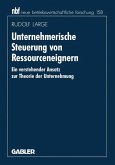The idea of self-regulation as an instrument capable of mitigating socially undesirable practices in industries - such as corruption, environmental degradation, or the violation of human rights - is receiving substantial consideration in theory and practice. By approaching this phenomenon with the theory of the New Institutional Economics, Jan Sammeck develops an analytical approach that points out the critical mechanisms which decide about the effectiveness of this instrument. By integrating theory with practical examples of self-regulation, this study highlights the necessity to look at the institutional incentives of an industry, in order to come to a sound judgement about the feasibility and effectiveness of this instrument in a given situation.
Dieser Download kann aus rechtlichen Gründen nur mit Rechnungsadresse in A, B, BG, CY, CZ, D, DK, EW, E, FIN, F, GR, HR, H, IRL, I, LT, L, LR, M, NL, PL, P, R, S, SLO, SK ausgeliefert werden.









